
Merle Ronald Haggard was an American country singer, songwriter, guitarist, and fiddler.
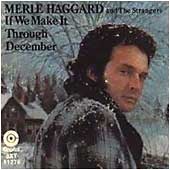
"If We Make It Through December" is a song written and recorded by American country music singer Merle Haggard and the Strangers. It was released in October 1973 as the lead single from the album Merle Haggard's Christmas Present, and was the title track on a non-Christmas album four months later. In the years since its release, "If We Make It Through December" — which, in addition to its Christmas motif, also uses themes of unemployment and loneliness — has become one of the trademark songs of Haggard's career.
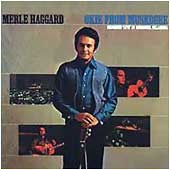
Okie from Muskogee is the first live album by Merle Haggard and the Strangers released in October 1969 on Capitol Records.

"Mama Tried" is a song written and recorded by American country music artist Merle Haggard and The Strangers. It was released in July 1968 as the first single and title track from the album Mama Tried. The song became one of the cornerstone songs of his career. It won the Grammy Hall of Fame Award in 1999, and was selected for preservation in the National Recording Registry due to its "cultural, historic, or artistic significance" on March 23, 2016, just 14 days before Haggard's death.
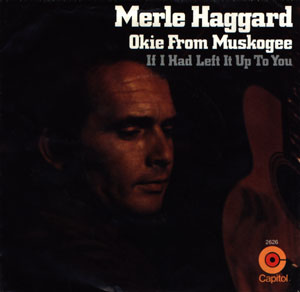
"Okie from Muskogee" is a song recorded by American country music artist Merle Haggard and The Strangers, which Haggard co-wrote with drummer Roy Edward Burris. "Okie" is a slang name for someone from Oklahoma, and Muskogee is the 11th largest city in the state. The song was released in September 1969 as first single and title track from the album Okie from Muskogee, and was one of the most famous songs of Haggard's career.

"Workin' Man Blues" is a song written and performed by American country music artist Merle Haggard and The Strangers. It was released in May 1969 as the second single from the album A Portrait of Merle Haggard. The song was released during his early peak and became one of several signature songs during his career.

"D-I-V-O-R-C-E" is a song written by Bobby Braddock and Curly Putman, and recorded by American country music artist Tammy Wynette. It was released in May 1968 as the first single and title track from the album D-I-V-O-R-C-E. Wynette's version was a number one country hit in 1968 and earned her a Grammy nomination for Best Country Vocal Performance, Female.

"Six Days on the Road" is an American song written by Earl Green and Muscle Shoals Sound Studio songwriter Carl Montgomery, made famous by country music singer Dave Dudley. The song was initially recorded by Paul Davis and released in 1961 on the Bulletin label. In 1963, the song became a major hit when released by Dudley, peaking at #2 on the Billboard Hot Country Songs chart and cracking the Top 40 (#32) on the Hot 100, leading to it being hailed as the definitive celebration of the American truck driver.

Mama Tried is the seventh studio album by American country music singer and songwriter Merle Haggard and The Strangers, released on Capitol Records in 1968. It reached number 4 on Billboard's country albums chart. The title song was one of Haggard's biggest hit singles and won the Grammy Hall of Fame Award in 1999.

A Portrait of Merle Haggard is the tenth studio album by American recording artist Merle Haggard and The Strangers, released September 2, 1969.
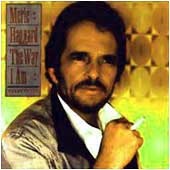
The Way I Am is the 30th studio album by American country musician Merle Haggard, released in 1980.
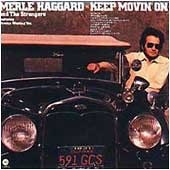
Keep Movin' On is the eighteenth studio album by American country singer Merle Haggard and The Strangers released in 1975. It reached number one on the Billboard country albums chart. "Movin' On" was a full-length version of a song Haggard recorded as the theme song to the TV series Movin' On.

"Sing Me Back Home" is a song written and recorded by American country music artist Merle Haggard and The Strangers. It was released in November 1967 as the first single and title track from the album Sing Me Back Home. The song was Merle Haggard and The Strangers third number one. The single spent two weeks at number one and a total of 17 weeks on the country chart. In 2019, Rolling Stone ranked "Sing Me Back Home" No. 32 on its list of the 40 Saddest Country Songs of All Time.

"Daddy Frank " is a song written and recorded by American country music artist Merle Haggard and The Strangers. It was released in September 1971 as the first single from the album Let Me Tell You About a Song. The song was Haggard and the Strangers tenth No. 1 on the Billboard Hot Country Singles. The song topped the chart for two weeks around Thanksgiving 1971, and spent 13 weeks in the chart's Top 40.

If I Could Only Fly is the fiftieth studio album by American country singer Merle Haggard, released in 2000. The album reached number 26 on the Billboard Country albums chart. The title song is a cover of a 1979 song written and recorded by Texas songwriter Blaze Foley. Haggard had previously recorded the song as a duet with American country singer Willie Nelson on their 1987 album, Seashores of Old Mexico, peaking at number 58 on the 1987 Billboard Hot Country Songs singles chart.

"I Take a Lot of Pride in What I Am" is a song written and performed by American country music artist Merle Haggard and The Strangers. It was released in October 1968 as the only single from his album Pride in What I Am. The song peaked at number three on the U.S. Billboard Hot Country Singles chart. It reached number-one on the Canadian RPM Country Tracks in January 1969. The song was covered by Dean Martin and released as a single in mid-1969. A tape recorder version of this song was played at the funeral of late Lynyrd Skynyrd vocalist, Ronnie Van Zant.

"I Threw Away the Rose" is a song written and recorded by American country music artist Merle Haggard and The Strangers. It was released in February 1967 as the first single from the album Branded Man. The song peaked at number two on the U.S. Billboard Hot Country Singles. In 1994 Lorrie Morgan recorded a version of the song which replaced the "I" in the lyrics with "you", changing it from a self-referential song to a song about someone else, for the Merle Haggard tribute album Mama's Hungry Eyes: A Tribute to Merle Haggard.
"Running Kind" is a song written and recorded by American country music artist Merle Haggard and The Strangers. It was released in January 1978 as the second and final single from the album, A Working Man Can't Get Nowhere Today. The song peaked at number 12 on the U.S. country singles chart and at number 10 on the Canadian country singles chart. The song was later covered by Radney Foster for the Haggard tribute album Mama's Hungry Eyes: A Tribute to Merle Haggard. Foster's version was released as a single in 1994 and peaked at number 64 on the U.S. country singles chart. Johnny Cash also covered the song with Tom Petty on the Unearthed box set.

Mama's Hungry Eyes: A Tribute to Merle Haggard is a tribute album to American country music artist Merle Haggard. It was released in 1994 via Arista Nashville. The album peaked at number 52 on the Billboard Top Country Albums chart. Proceeds from the album go to Second Harvest Food Bank.
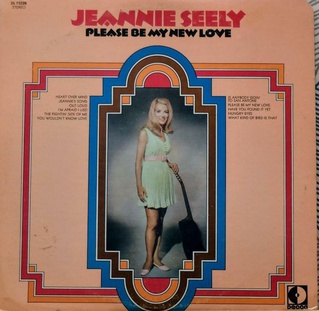
Please Be My New Love is a studio album by American country artist Jeannie Seely. Her sixth studio album, it was released in August 1970 on Decca Records and was produced by Walter Haynes. The album did not reach any major chart positions, however, the project did include one charting single. Please Be My New Love was her third studio album with the Decca label.



















